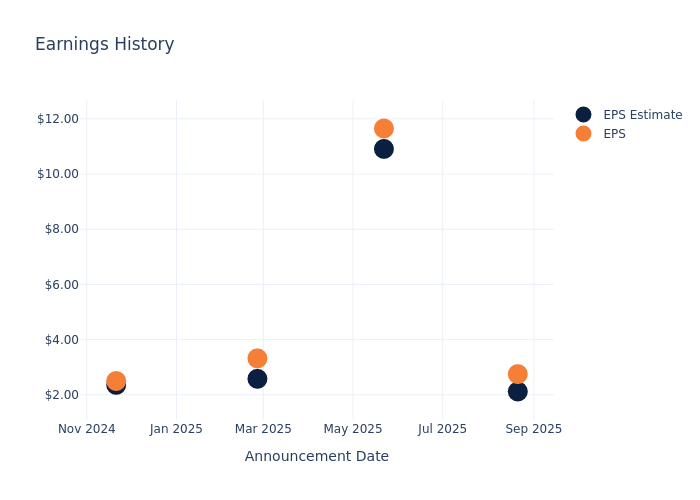What to Expect from Intuit's Earnings
Author: Benzinga Insights | November 19, 2025 09:01am
Intuit (NASDAQ:INTU) is preparing to release its quarterly earnings on Thursday, 2025-11-20. Here's a brief overview of what investors should keep in mind before the announcement.
Analysts expect Intuit to report an earnings per share (EPS) of $2.51.
Investors in Intuit are eagerly awaiting the company's announcement, hoping for news of surpassing estimates and positive guidance for the next quarter.
It's worth noting for new investors that stock prices can be heavily influenced by future projections rather than just past performance.
Earnings Track Record
In the previous earnings release, the company beat EPS by $0.63, leading to a 5.03% drop in the share price the following trading session.
Here's a look at Intuit's past performance and the resulting price change:
| Quarter |
Q4 2025 |
Q3 2025 |
Q2 2025 |
Q1 2025 |
| EPS Estimate |
2.12 |
10.91 |
2.58 |
2.36 |
| EPS Actual |
2.75 |
11.65 |
3.32 |
2.50 |
| Price Change % |
-5.00 |
8.00 |
13.00 |
-6.00 |

Market Performance of Intuit's Stock
Shares of Intuit were trading at $649.73 as of November 18. Over the last 52-week period, shares are down 4.27%. Given that these returns are generally negative, long-term shareholders are likely upset going into this earnings release.
Analyst Views on Intuit
For investors, staying informed about market sentiments and expectations in the industry is paramount. This analysis provides an exploration of the latest insights on Intuit.
The consensus rating for Intuit is Outperform, derived from 11 analyst ratings. An average one-year price target of $813.0 implies a potential 25.13% upside.
Analyzing Ratings Among Peers
The below comparison of the analyst ratings and average 1-year price targets of AppLovin, Salesforce and Adobe, three prominent players in the industry, gives insights for their relative performance expectations and market positioning.
- Analysts currently favor an Outperform trajectory for AppLovin, with an average 1-year price target of $721.74, suggesting a potential 11.08% upside.
- Analysts currently favor an Outperform trajectory for Salesforce, with an average 1-year price target of $324.07, suggesting a potential 50.12% downside.
- Analysts currently favor an Outperform trajectory for Adobe, with an average 1-year price target of $438.33, suggesting a potential 32.54% downside.
Analysis Summary for Peers
The peer analysis summary provides a snapshot of key metrics for AppLovin, Salesforce and Adobe, illuminating their respective standings within the industry. These metrics offer valuable insights into their market positions and comparative performance.
| Company |
Consensus |
Revenue Growth |
Gross Profit |
Return on Equity |
| Intuit |
Outperform |
20.32% |
$2.94B |
1.91% |
| AppLovin |
Outperform |
68.23% |
$1.23B |
63.27% |
| Salesforce |
Outperform |
9.77% |
$7.99B |
3.09% |
| Adobe |
Outperform |
10.72% |
$5.35B |
15.26% |
Key Takeaway:
Intuit ranks at the top for Gross Profit and Return on Equity among its peers. It is in the middle for Revenue Growth.
Get to Know Intuit Better
Intuit serves small and midsize businesses with accounting software QuickBooks and online marketing platform Mailchimp. The company also operates retail tax filing tool TurboTax, personal finance platform Credit Karma, and a suite of professional tax offerings for accountants. Founded in the mid-1980s, Intuit enjoys a dominant market share for small-to-midsize business accounting and self-serve tax filing in the US.
Intuit: Financial Performance Dissected
Market Capitalization Analysis: The company's market capitalization is above the industry average, indicating that it is relatively larger in size compared to peers. This may suggest a higher level of investor confidence and market recognition.
Revenue Growth: Intuit's revenue growth over a period of 3 months has been noteworthy. As of 31 July, 2025, the company achieved a revenue growth rate of approximately 20.32%. This indicates a substantial increase in the company's top-line earnings. In comparison to its industry peers, the company trails behind with a growth rate lower than the average among peers in the Information Technology sector.
Net Margin: The company's net margin is below industry benchmarks, signaling potential difficulties in achieving strong profitability. With a net margin of 9.95%, the company may need to address challenges in effective cost control.
Return on Equity (ROE): Intuit's ROE is below industry averages, indicating potential challenges in efficiently utilizing equity capital. With an ROE of 1.91%, the company may face hurdles in achieving optimal financial returns.
Return on Assets (ROA): The company's ROA is a standout performer, exceeding industry averages. With an impressive ROA of 1.04%, the company showcases effective utilization of assets.
Debt Management: Intuit's debt-to-equity ratio is below the industry average. With a ratio of 0.34, the company relies less on debt financing, maintaining a healthier balance between debt and equity, which can be viewed positively by investors.
To track all earnings releases for Intuit visit their earnings calendar on our site.
This article was generated by Benzinga's automated content engine and reviewed by an editor.
Posted In: INTU






